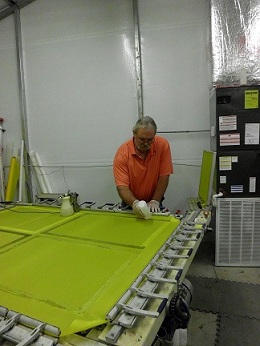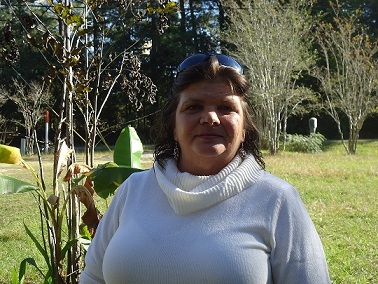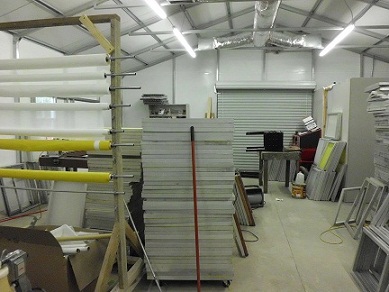Two days before Christmas in 2007, Glenn and Sara Sasser's plans were obliterated like an unsuspecting step on a hidden land mine.
On a recent truck run from Columbus to Macon in Georgia, Glenn spoke softly, pausing a few times when he remembered the day his wife of 20 years passed away on Dec. 23 that year.
“She died in my arms. It was unexpected. She had lung cancer. A tumor ruptured, and she bled to death.”
The next two years were a haze, Sasser said. He kept on working, staying on the road, trying to keep the pain and loneliness at bay. But buried way down beneath the hurt was a path that his wife would want him to continue on.
“I walked out on the porch one cool, crisp Saturday morning, took a deep breath and said, 'It's time to get on with my life,'” Sasser recalled.
Perhaps saying that thought out loud shifted the course of what was then a burgeoning silkscreen business.
At the age of 55, Sasser's routines have become more of a barometer of what takes priority over time wasters. Adhering to a tight schedule can mean the difference between getting paid for making a haul on time versus filling an order to remesh 100 old frames so that a wholesaler can have them back in time for the grand opening of a new restaurant.
Dressed in a tangerine colored shirt and blue jeans, at around six feet tall and with a hulky build, Sasser acknowledged he can come across as intimidating. His neck-length silver hair in a loose ponytail and a deep, all-business voice cloaked in a southern twang, he rarely cracked a smile. But when he did, his entire face lit up.
Glenn Sasser, owner of A Plus Silk Screen, applies glues to wide swaths of mesh that will adhere to the frames in seconds. Alabama Telco Credit Union helped provide the capital to purchase one of several of the stretchers like the one pictured here.
Financial Setbacks
He likely takes on a no-nonsense demeanor to keep the focus on building A Plus Silk Screen, a small business in Odenville, Ala., a one traffic-light town of 3,585 about 20 miles northeast of Birmingham. Sasser takes used frames, turns them into new ones and applies a silk screen so that designs can be transferred on everything from cereal boxes to bottles to ink pens.
The procedure may sound straightforward, but there are a number of moving parts behind the scenes to make it all happen. How Sasser came to start up his fledgling10-year old business is a series of twists and turns peppered along the way with personal and financial setbacks. The $590 million Alabama Telco Credit Union in Birmingham, Ala., filled the voids after several banks flatly refused to provide financing. Among them, BB&T and Bank of America.
“We needed a cash injection. Small businesses can't afford to absorb fees like the bigger ones can,” Sasser said. “We're not going anywhere” of his relationship with the credit union.
There are many outfits offering silk screening, but only a handful are engaged on a national scale in the manufacturing of frames, Sasser said. Given the contacts he had made over the years, he knew he could break in, but the knowledge didn't come overnight.
“It was a lot of trial and error. A lot. It was certainly learning as you go.”
In the middle of that learning curve was figuring out where and who would provide the capital for a business so unique, possibly too risky and most likely unheard of by most lenders. At one point, Sasser had 13 different accounts at Telco. While most were on the consumer side, he held a few business deposits at the cooperative.
As the silk screen business grew, and Sasser ventured more into remeshing and frame manufacturing, his quest for the right kind of equipment took him around the country and beyond to China. After obtaining an import-export license in 2010, he was able to establish a contact there that sold him mesh cheaply and that was not sold in the United States.
But Telco, which is how many members refer to the credit union, didn't offer international wire transfers, a critical transaction for shipping the mesh across international borders. After some consideration, he moved his business accounts down the street to a branch belonging to the $178.5 billion BB&T Corp., which did handle international remittances.
“The one thing about dealing with companies abroad is things have to be paid up front,” Sasser said. “I have had CDs, money market accounts, pretty much everything Telco had to offer. My business stayed with them until I had to go to BB&T.”
It is a decision Sasser regrets to this day. He applied for a $25,000 loan to continue building the silkscreen business. Despite having $40,000 in savings at BB&T, a 789 credit score and a solid financial history, he was turned down. The bank said Sasser had not been a BB&T customer long enough.
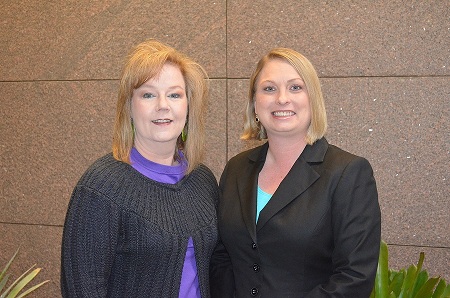
Lynn Middleton, branch manager (left) at Alabama Telco, who's known Glenn Sasser for at least a decade, said he has a reputation for being an honest man. Julie Thomason, business development officer, said Sasser's business is just the type the credit union is looking to help start and expand.
Final Bank Insult
The final insult occurred when Sasser transferred $15,000 from Telco to his new bank and it charged him a fee. Boiling, he walked into the lobby one day, asked for the $15,000 back–in cash–and never looked back.
“When you're with a larger bank, you become a number.”
It was around this time that Telco hired Julie Thomason to create a new business services division in July 2011. As a former staffer at a community bank and a larger regional bank for 10 years, she knew that business loans were not only risky but more expensive to undertake than consumer loans. Offering products and services piecemeal to business owners just wasn't going to cut it.
“If you don't offer them the whole package in the beginning, you're going to lose them,” said Thomason, Telco's business development officer.
After conducting a focus group with small businesses, Thomason was able to hone in on what the new division at Telco would look like. The first phase was merchant services and deposit accounts such as checking, savings, CDs and payroll. The next phase included a variety of business loans, bill payment, invoicing and an integration of QuickBooks.
“The minute I found out that Telco was going to handle business services, I couldn't get over there fast enough,” Sasser said. “I came back because I missed the people and the service.”
That was around December 2011. He called Lynn Middleton, one of the credit union's branch managers who Sasser had known since her days as a teller a decade ago. She asked him to come by because there was someone there she wanted him to meet. It was her husband, David. The two men had known each other for years since David, a technician who trains mechanics for Firestone, was Sasser's mechanic. In fact, Sasser had known David longer than he knew David's wife.
“Glenn is one of the most honest people I know,” Lynn said. “He would bring in checks from clients, and I would ask him, 'Are you sure you're comfortable with these deposits?' We never had an issue. He just knew his customers.”
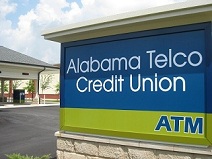
Alabama Telco expanded its business services in early 2012 to include loans and the one service that brought Glenn Sasser back to the credit union: international wire transfers.
Full Business Services
By February 2012, Telco had a full suite of business services that now included international wire transfers. Thomason said by the end of 2012, the credit union will have 28 business loans totaling $5 million in its lending portfolio and $4 million in business deposits. Telco outsources its underwriting with Member Business Solutions LLC, a Tallahassee, Fla.-business lending CUSO wholly owned by the $5 billion Corporate One Federal Credit Union in Columbus, Ohio.
Sasser's silkscreen business fell right in with Telco's target business audience–small to medium-sized with annual revenue of $5 million or less. The fledgling manufacturer currently employs two independent contractors. While Telco and Sasser have committed to growing the business, the country's financial downturn has actually brought in more clients.
That's mainly because when the economy is booming, businesses don't mind spending money on more expensive techniques such as embroidery. But when watching the bottom line became more urgent over the past few years, firms were looking for ways to stretch dollars and do more with less. Some turned to remeshing as an alternative.
“His business is a perfect example of a small business that is expanding,” Thomason said. “His product was so unique because not many people were doing it, but there is a need for it.”
Thomason said after looking at Sasser's business plan, financials and his expanding customer base, Telco saw an opportunity to support a homegrown firm. The credit union approved a line of credit for Sasser to buy a new bar stretcher, a machine that pulls mesh in four directions and allows it to be glued to a frame.
“When we started out business loan program, we cherry picked our loans because we wanted to do it the right way,” Thomason said. “A lot of banks were not lending even though there were great businesses out there with strong cash flow and strong sales. They just didn't fit the banks' model. Those were the ones we wanted to target.”
From her days as a former banker, Thomason said she noticed that while businesses had substantial cash flow over the last 10 to 15 years, banks were only looking at one year of the financials. If a business had a poor credit score or was too small, some financial institutions stopped offering them products such as lines of credit and loans in an effort to clean up their books, she added.
“We look at trends and the whole picture. We know that businesses may have down time,” Thomason said. “I never like to say no to a member, but I have to be cautious because the decision has to benefit the credit union and members. I've had to tell people, 'This loan is not going to help you.' If they're declined, I'll tell them what they need to work on. We try to find a happy medium.”
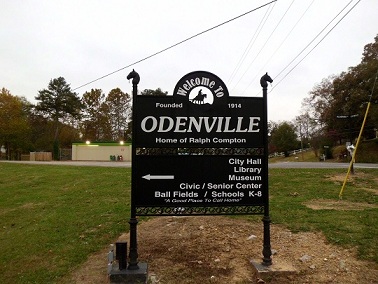
Odenville, a town of 3,585 about 20 miles northeast of Birmingham, Ala., is home to Glenn Sasser's business, A Plus Silk Screen.
Equipment Upgrade
Telco has certainly provided some financial ease for Sasser to continuing funding his business. Still, that doesn't stop the tossing and turning on other issues. If it's 2 a.m., he is likely somewhere struggling to get back to sleep.
Somewhere might be his warm bed in a modest home off a quiet road in Odenville. Or, as a full-time commercial truck driver, he may be catching a few winks at a truck stop off any given highway zigzagging across Georgia, South Carolina or Tennessee en route to deliver a haul.
Sasser laughed heartily when asked if we could meet early one Saturday morning, say, around 11 a.m. “That's early?” he teased. “I usually get up around 3 a.m. I get up, eat my biscuit, and I'm on my way.”
His restlessness stems from always thinking about ways to grow A Plus Silk Screen, from calculating the potential revenue from a big manufacturer on the East Coast to how a new welding machine will be able to put together more frames much faster.
Born in Florala, Ala., a border town named for its spot on the Florida and Alabama state line, Sasser got his entrepreneurial start at 13, shoveling snow and cutting grass for neighbors. Earning part of his keep, the extra funds covered expenses and profits left over to buy what a teenager might in 1970.
Back then, Sasser figured an equipment upgrade could surely boost profits. One summer day, he approached his father, a well-known figure in town, about a possible loan.
“I asked him for $300 so that I could get a better, self-propelled lawnmower,” Sasser recalled. “We went down to Citizens Bank. It was one of those hometown banks where everyone knew my dad. Well, I got the loan.”
And Sasser paid back every cent.
Because his father was in the Navy, the family relocated around the country, but Sasser landed back in Alabama in 1984. The early 1980s were a boon when he worked for an oil drilling company making $100,000 a year. Then the industry's bottom fell out and at the age of 23, Sasser faced a stark reality. “From that time on, I knew to always have a backup plan.”
Along the way he married Sara, who was a member of Alabama Telco Credit Union and worked for a local firm that made welding fixtures and other pieces of equipment.
Sasser's brother-in-law owned an excavating company and encouraged him to get a commercial driver's license so that he could help him make truck runs. Sasser was soon driving up and down the nation's highways for a major company.
The next part of Sasser's entrepreneurial circle came in 1989 when he started a leather arts and crafts making business. Soon after, a friend began having health problems and asked Sasser if he would be interested in taking over his car tag kiosk at a local mall. For $4.50 a piece, he sold splashy car adornments that featured 300 custom designs, including trucks, fishermen, flowers and names in big, bold colors and scripts. “I did really well,” he said, cracking a rarely seen smile, remembering the booming activity.
Sasser was now running two businesses while continuing to drive a tractor-trailer to haul goods all over the East Coast.
Garfield T-Shirt
The silk screening came on a whim. Sasser's stepdaughter asked if he would design a Garfield T-shirt for Christmas. Puzzled about whether he could pull it off, Sasser thought about the process and how it compared to the airbrushing he did know how to do on his leatherwork.
Pleased with how the T-shirt came out, Sasser wondered how much more he could do with silk screens. After doing extensive research, he bought a one-station, four-color printing screen and built a stretcher to place the frames and screens on. One day, an inquisitive fellow stopped by and asked what Sasser was planning to do with all of the old frames. That question led to his first attempts at remeshing.
At the time, Sasser had been on the road for 10 years when Sara said of the leather and car tag businesses, 'We're changing presidents, the economy's going to change, why don't you just sell them?'
Sasser agreed and sold the shops in 2000. Sara's job kept her traveling nearly three weeks out of the month. Together, the couple made treks all over Alabama with Sasser drumming up new contacts along the way for his silkscreen business, still in its infancy.
Everything hummed along. The two were able to spend more time together, and Sasser and Sara were “in high cotton,” earning about $180,000 a year between his truck driving, the frame business and her salary. They had dreams of buying a house along the picturesque beaches of Gulf Shores, Ala., where ocean fishing and lush golf courses were common lures to the coastal community.
The day Sara died on Dec. 23, 2007, Sasser's plans didn't matter anymore as he re-lived the image of his wife dying in his arms.
“It was a video. I couldn't stop seeing it. It played over and over. I call them daymares. As long as I was awake, it was there,” Sasser recalled. “That lasted for about two years. I can talk about it now, but before, if someone said something like '23rd,' I'd flash back.”
After deciding to continue on, a pivotal turn actually came when a company Sasser did remeshing for decided to get out of the outsourcing business. He started buying wooden frame blanks from a firm in Michigan, remeshed them and sold them to a company located near where he lived. For years, the relationship was a very profitable one even though it took him out of circuit with end users or those who just wanted to print items such as T-shirts.
When the company that pulled the plug on its remesh outsourcing with Sasser, it closed up a substantial stream of income. Sasser said he was making $50,000 on the weekends. Still, he was confident that he had tapped into something with potentially bigger income streams.
He started purchasing equipment with some of his savings, including a clamp stretcher for $23,000 and then a motor-driven clamp stretcher, which dwarfs the bar stretchers and cost around $80,000. In all, he has four clamp stretchers.
“I've got Cadillacs now,” Sasser said of his upgraded equipment. “With the amount of work we're getting, they have literally paid for themselves.”
In the beginning, Sasser was conducting his business from a 14- by 32-foot shed behind his home. He quickly outgrew the space and was able to secure financing from Telco for a 1,200-square-foot building and units to cool and heat the shop. Together, the building and wiring cost $27,000, which he could afford thanks to his Telco line of credit.
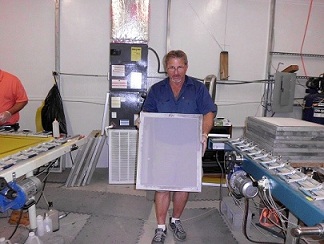
As A Plus Silk Screen grew, Glenn Sasser not only need more funds but more employees. Two years ago, Eddie Lawson, pictured here, came aboard as an independent contractor.
Needing Extra Funds
Thomason recalled that just as Sasser was nearing the completion of the new building, he needed additional cash. After some restructuring, she was able to free up some extra funds. Even considering how fast his business is growing, Sasser's not worried about running out of space. He said he has enough acreage to put three more similar-sized buildings on his property.
“Without the credit union, I wouldn't be where I am.”
Sasser still uses the smaller building behind his home to come up with faster and more precise equipment to weld the aluminum frames together. A machine called a Gopher binds corners together in four seconds.
Stepping inside, long, thin planks of aluminum are stacked knee-high in the middle of the space. On the wall opposite the Gopher is a machine with three drills that cuts the pieces immaculately. In the corner is a creation that has the promise of welding frames much faster than some of its competitors.
A fellow trucker, Eddie Lawson, built the automated spot welder. He has been working with Sasser on the silkscreen business for the last two years. Tanned with light, copper colored hair, Lawson encouraged this reporter to weld a frame on the Gopher. With all of its knobs and gadgetry and the fear of possibly cutting a finger hanging in the air, the weld was surprisingly light, fast and easy. Lawson filed the edges down super smooth to prevent any cuts.
He is almost giddy over the potential speed of the machine in producing more frames.
“I've seen so much over the past two years. Putting in the extra hours is worth it,” Lawson said.
It helps, he added, working with some that abhors sugar coating.
“He doesn't pull punches. To my knowledge, he's never lied to me,” Lawson said. “He's been in it so long. He has the business knowledge, that's for sure.”
Roughly a year ago, Eddie's son, Douglas, 22, came on board to train under Sasser. The younger Lawson now moves deftly between stretchers using a Newton meter to measure the tautness of the mesh pulled over the frames.
At the time of the visit, Douglas' fiancée was due any day with their first child. Still, he continued to work well into the evening, checking in with Sasser on the next tasks that awaited him. On Nov.1, the couple welcomed their daughter into the world.
Adding Employees
Sasser said he envisions the day when the Lawsons will be running the business without him. Ideally, he would like to have 10 to 15 employees.
And, he's still thinking about heading down to Gulf Shores. Telco provided the financing for a piece of property there but because the insurance was higher than the mortgage payment, he opted out of it.
Sasser is also dating again. About three and half years ago he became reacquainted with Charayne Yancey. They lived about five houses down from each other growing up in Alabama. Though younger than Sasser, Yancey chuckled at her failure to remember the kid who would cut her parent's grass while she practiced her majorette moves in the front yard. They later went to the same high school dances but still never really interacted despite Yancey's cousin and Sasser being best friends.
“He said, 'I'll never forget how you looked in that shiny, blue majorette suit,'” said Yancey, who grew up in Opp, an Alabama town 20 miles from the Florida state line.
Sasser left the area at the age of 18. Both went on with their lives, got married and settled down. Ironically, Yancey became a commercial truck driver too, making runs from coast to coast. It was in 2009 when their paths crossed on Facebook. Yancey's husband had died, so she knew the type of grief Sasser experienced when his wife died in 2007.
“I think he needed someone to talk to,” Yancey recalled. “We found out we had a lot in common.”
Soon, Yancey became one of Sasser's biggest cheerleaders, encouraging him to keep going with his business. She works in sales and takes advantage of any opportunity to talk up A Plus Silk Screen. A few clients have come his way through her word of mouth.
But the couple has a long-distance relationship. She lives 200 miles away from Sasser. An only child, Yancey still lives in Opp so that she can care for her elderly mother. While they only see each other once a month, it's clear that when they lock eyes, there is a true connection.
“His bark is a lot worse than his bite. He's sweet,” Yancey said. “You know, we sometimes agree to disagree on things.”
On a recent gray, autumn evening over a meal of juicy hamburgers with thick slices of tomatoes, red onions, crisp green lettuce and bottles of Coca-Cola, Sasser thought about where he wants to take his business and whether the work has taken a toll on him.
“Being an entrepreneur is a blessing and a curse. A blessing because it's what drives me. Without it, I would've given up a long time ago. A curse because my mind never gets to shut down.”
Yancey nodded in agreement on the curse explanation. A petite woman with beautifully manicured pink nails and feathered brown hair, she has a soft spot for the cats that roam in and out of Sasser's house.
“I think it's rubbed off on me. Numbers are always going through my head,” she said.
On our way back to the shop, Sasser pointed to Eddie and said, “I think I've rubbed off on him, too, because he thinks about the business just as much as I do.”
Charayne Yancey grew up five houses down from Glenn Sasser in rural Alabama. Since reconnecting on Facebook, she's been one of his biggest cheerleaders, bringing in a few new clients to Sasser's growing business.
Even though a $100,000 loan from Wells Fargo may have helped towards the purchase of more materials to make frames, Glenn Sasser refused to do business with any bank.
Banks Beg
So committed are they to taking the silk screen and frame-making operation to the next level, Sasser and the Lawsons have worked through the night to fill orders. A buyer from Las Vegas recently flew in to pick up 100 frames, their largest order to date.
Things are moving so fast that more banks and other entities have started contacting Sasser to inquire about establishing partnerships. Wells Fargo Bank recently offered him a $100,000 loan, but he turned it down.
“I didn't want to go back to the big banks,” Sasser said.
Between Telco and the $140,000 of his own money that he's invested in the business, Sasser said it's hard to say when he will be able to stop making truck runs. He's ready though.
“I'm doing more business now than I was 10 years ago. I have grown since the downturn.”
Sasser said small businesses have a litany of taxes to deal with. Yet, he's not bitter about it.
“When it's all said and done, taxes are coming whether you like it or not. I've been in a recession before. I remember when you couldn't sell gas on Sundays,” Sasser said. “The economy is resetting itself.”
With only six major frame companies in the United States, A Plus Silk Screen could be the final arc in the entrepreneurial circle that began to form when Sasser shoveled snow and cut grass as a young boy.
And it's not going to happen by aligning with banks. “All of that is greed, and it will get you every time,” Sasser said of the banking industry's ongoing attempts in Washington to limit business lending authority for credit unions.
With Telco backing him, continued growth is not a dream–it's a requirement. He reflects on where he would be if his wife had lived.
“Neither one of us made enough money separately to support the whole household. When you have just one income, you have to watch things more carefully. I see this as my second chance. I got one list with 1,300 customers on it. They're not my customers–yet.”
© Touchpoint Markets, All Rights Reserved. Request academic re-use from www.copyright.com. All other uses, submit a request to [email protected]. For more inforrmation visit Asset & Logo Licensing.

